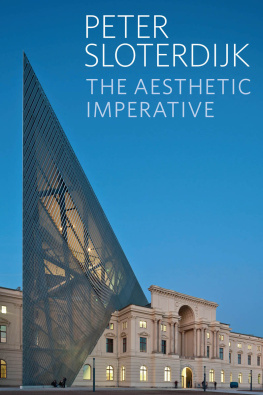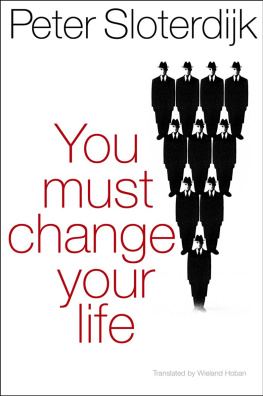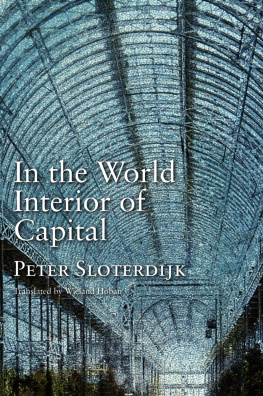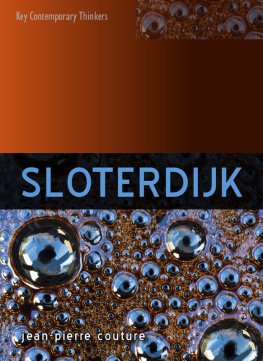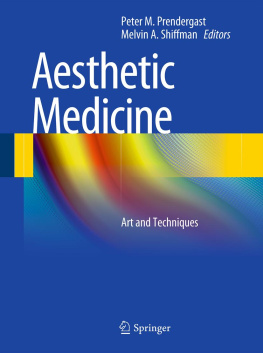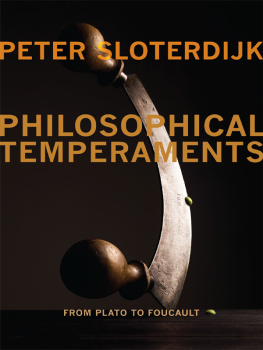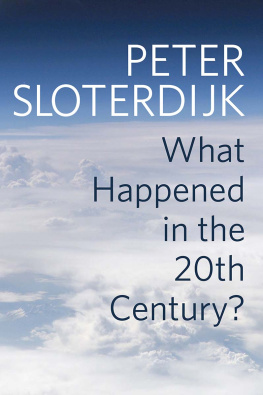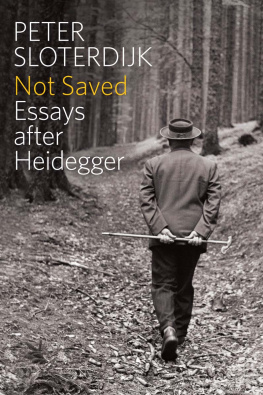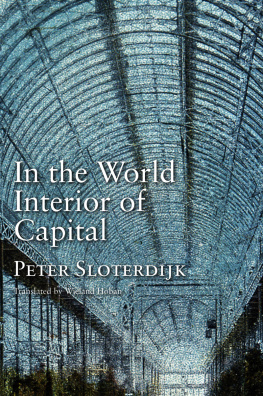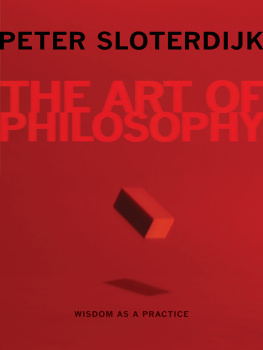Sloterdijk Peter - The aesthetic imperative: writings on art
Here you can read online Sloterdijk Peter - The aesthetic imperative: writings on art full text of the book (entire story) in english for free. Download pdf and epub, get meaning, cover and reviews about this ebook. City: Cambridge;England, year: 2017, publisher: Polity Press, genre: Romance novel. Description of the work, (preface) as well as reviews are available. Best literature library LitArk.com created for fans of good reading and offers a wide selection of genres:
Romance novel
Science fiction
Adventure
Detective
Science
History
Home and family
Prose
Art
Politics
Computer
Non-fiction
Religion
Business
Children
Humor
Choose a favorite category and find really read worthwhile books. Enjoy immersion in the world of imagination, feel the emotions of the characters or learn something new for yourself, make an fascinating discovery.
- Book:The aesthetic imperative: writings on art
- Author:
- Publisher:Polity Press
- Genre:
- Year:2017
- City:Cambridge;England
- Rating:4 / 5
- Favourites:Add to favourites
- Your mark:
- 80
- 1
- 2
- 3
- 4
- 5
The aesthetic imperative: writings on art: summary, description and annotation
We offer to read an annotation, description, summary or preface (depends on what the author of the book "The aesthetic imperative: writings on art" wrote himself). If you haven't found the necessary information about the book — write in the comments, we will try to find it.
The aesthetic imperative: writings on art — read online for free the complete book (whole text) full work
Below is the text of the book, divided by pages. System saving the place of the last page read, allows you to conveniently read the book "The aesthetic imperative: writings on art" online for free, without having to search again every time where you left off. Put a bookmark, and you can go to the page where you finished reading at any time.
Font size:
Interval:
Bookmark:

Peter Sloterdijk
Edited and with an Afterword by Peter Weibel
Translated by Karen Margolis
polity
First published in German as Der sthetische Imperativ Schriften zur Kunst
Suhrkamp Verlag, Berlin, 2014
This English edition Polity Press, 2017
Polity Press
65 Bridge Street
Cambridge CB2 1UR, UK
Polity Press
350 Main Street
Malden, MA 02148, USA
All rights reserved. Except for the quotation of short passages for the purpose of criticism and review, no part of this publication may be reproduced, stored in a retrieval system or transmitted, in any form or by any means, electronic, mechanical, photocopying, recording or otherwise, without the prior permission of the publisher.
ISBN-13: 978-0-7456-9990-5
A catalogue record for this book is available from the British Library.
Library of Congress Cataloging-in-Publication Data
Names: Sloterdijk, Peter, 1947- author.
Title: The aesthetic imperative : writings on art / Peter Sloterdijk.
Other titles: esthetische Imperativ. English
Description: English edition. | Malden, MA : Polity Press, 2017. | Includes bibliographical references and index.
Identifiers: LCCN 2016039423 (print) | LCCN 2016040495 (ebook) | ISBN 9780745699868 (hardback) | ISBN 9780745699875 (pbk.) | ISBN 9780745699899 (Mobi) | ISBN 9780745699905 (Epub)
Subjects: LCSH: Arts, Modern--21st century. | Art--Philosophy.
Classification: LCC NX460 .S5913 2017 (print) | LCC NX460 (ebook) | DDC 709.05--dc23
LC record available at https://lccn.loc.gov/2016039423
Typeset in 10.5 on 12pt Times by Servis Filmsetting Ltd, Stockport, Cheshire Printed and bound in the United Kingdom by Clays Ltd, St Ives PLC
The publisher has used its best endeavours to ensure that the URLs for external websites referred to in this book are correct and active at the time of going to press. However, the publisher has no responsibility for the websites and can make no guarantee that a site will remain live or that the content is or will remain appropriate.
Every effort has been made to trace all copyright holders, but if any have been inadvertently overlooked the publisher will be pleased to include any necessary credits in any subsequent reprint or edition.
For further information on Polity, visit our website: politybooks.com
One A.M. and The Crowd from Paris Spleen: Little Poems in Prose. 2009 by Keith Waldrop. Published by Wesleyan University Press. Used by permission.
My Dead Body by Patrick McGrath. Published by Brooklyn Museum, 1998.
Copyright Patrick McGrath. Reproduced by permission of the author c/o Rogers, Coleridge & White Ltd., 20 Powis Mews, London W11 1JN, UK.
WORLD OF SOUND
Ladies and gentlemen, abundant attempts have been made to define the essence of music. Some people have described it as structured time or as a synthesis of calculated order and mysterious caprice, while others have seen its higher manifestations as the meeting between rigorous form and the gestures of free self-expression, or simply as passion colliding with the world of numbers. Yet none of these statements can match the famous dictum of Thomas Mann in his novel Doctor Faustus. Inspired by Kierkegaard, Mann reached the conclusion that Music is demonic territory.
This phrase, which has since become a mantra for musicologists, is notable for several reasons; moreover, it increasingly requires comment. When it first appeared in 1947 it merely aimed at illuminating the murky secrets of German culture, an area where, it was said, musicality and bestiality had become confusingly intertwined. At the same time, Manns dictum was supposed to indicate how, on the ground of modernism, artistically beautiful things could change into things that are artistically evil, and how diabolical guile could transform the best forces of a high civilization into their opposite. From todays perspective, Manns statement has a special impact in that it replaces a definition with a warning as if the author wanted to admit that it is impossible for some topics to lead to objective theory because they do not remain still while they are being worked on by theory. Instead, sleeping lurking monsters rouse from their slumbers and rear their heads as soon as we talk about them. According to the author of Doctor Faustus, musicologists would be well advised to study the conclusion of Christian demonologists that demons are not neutral. Instead of being model objects that can be investigated at a safe distance, they are a power that responds to invocation. Anyone who calls the dark spirit by name has already invoked him, and the invoking person should be aware that he can be confronted with an authority that will be stronger than he is. That is why folk tales say of Doctor Faust: If you know something, keep it quiet.
Let us briefly look at which kind of demonic possession is involved when we enter the territory of music assuming that this is about a territory that can be entered like a ground or terrain. We must seek the answer in the acoustic anthropology that has acquainted us with a large number of inspiring new findings on human hearing in recent decades. They have taught us that among members of Homo sapiens, like other mammals or creatures that bear live offspring, and even among many birds, hearing is an ability that is acquired very early, actually in prenatal space. The ear is indisputably the leading organ of human contact with the world, and this is already the case at a point in the organisms development when the individual as such is not yet there to the extent that the adverb there indicates the possibility that a person is at a sufficient distance from things to be able to point to an object or circumstance. Even in adults, hearing is not so much an effect the subject experiences in relation to a source of sound, but occurs rather as immersion of the sensitive organ and its owner in an acoustic field. This applies even more strongly to the hearing of the unborn child. If the first auditory experience signifies a foetal prelude to the mature use of the acoustic sense, it is mainly because at that moment the feature of floating in a total environment is at its purest. The first hearing experience inherently resembles a pre-school of cosmopolitanism, literally of world openness yet we attend this school, effectively the cole maternelle, at a stage of life when we ourselves are still completely worldless and pre-worldly. The individual-to-be persists as far as possible in its intimate reserve, enclosed in a warm misty night, yet still listening behind the door of existence. But it would be confusing to describe the hearing foetus merely as an eavesdropper behind the door. The primal hearers way of being is defined from the very beginning by its embedding in an internal sonorous continuum dominated by two emanations from its maternal surroundings: first, the sounds of the mothers heart that set the existential beat like a constant repetitive rhythm; and, second, her voice producing free prose that impregnates the foetal ear with a melodic dialect. These two universal factors of the formation of intra-uterine hearing, the cardiac basso continuo and the mothers soprano speaking voice, create the outline of the utopian continent of proto-music or endo-music, and we first have to overcome the almost constant presence of these two factors to reach a horizon within which more unfamiliar, more intense and more distant sonic events communicate a kind of acoustic summer lightning coming from the world.
Font size:
Interval:
Bookmark:
Similar books «The aesthetic imperative: writings on art»
Look at similar books to The aesthetic imperative: writings on art. We have selected literature similar in name and meaning in the hope of providing readers with more options to find new, interesting, not yet read works.
Discussion, reviews of the book The aesthetic imperative: writings on art and just readers' own opinions. Leave your comments, write what you think about the work, its meaning or the main characters. Specify what exactly you liked and what you didn't like, and why you think so.

